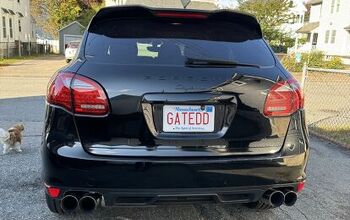National Transportation Safety Board Makes Biennial Recommendations in 'Most Wanted List'

The National Transportation Safety Board (NTSB) has released its “Most Wanted List” of Transportation Safety Improvements it would like to see implemented by 2020, placing the obligatory emphasis on enhanced safety regulations. While it’s not surprising that a safety board would be a stickler on the public’s welfare, the NTSB is pushing for more safety nets in an era where cars are less dangerous than ever. That meant the agency’s recommended occupant protection measures dealt more with refining infrastructure and curtailing undesirable behaviors than modifying automobiles — but there was some of that as well.
According to the NTSB, automakers, motorists, and the National Highway Traffic Safety Administration (NHTSA) should be focusing on finding better solutions to curtail distracted driving, operating a vehicle under the influence, and speeding. Then, and only then, can we achieve the NTSB’s dream of death-proof driving.
“Tens of thousands of people die in transportation accidents and crashes every year — our neighbors, our coworkers, our schoolmates, our family members,” explained the independent agency. “But they don’t have to. Most of these deaths are completely preventable. With each accident, we learn lessons about safety gaps and make recommendations that, if acted upon, could close these gaps.”
All told, the NTSB made almost 270 suggestions this year. For cars, the one of the biggest inclusions involved the nationwide banning of all mobile devices and help from the industry to create a device that would disable cellphones while in motion.
It also requested that national speed limits be kept to a minimum, with a follow-up request that the NHTSA “identify [the] best practices for communicating with law enforcement officers and the public about the effectiveness of data-driven, high-visibility enforcement programs to reduce speeding, and disseminate the best practices to local law enforcement agencies.” There was even talk about developing speed-limiting technologies,(e.g. variable speed limiters and intelligent speed adaptation devices) for use heavy vehicles, like trucks and buses.
A curiously strong emphasis was placed on mitigating impaired driving. In addition to calling for alcohol detection systems to be placed in vehicles, it faulted the NHTSA for not supporting these types of programs. Sounds ridiculous, right? Well, Rep. Debbie Dingell (D-MI) announced plans to introduce legislation that would mandate a breathalyzer in every new vehicle just last month.
“If we can keep one person from dying on the roads and make people think twice before getting behind the wheel when they shouldn’t. Even when they’re buzzed and think they are okay. Can’t we say we’ve been successful?” she said on the House floor in January.
However, the NTSB has allies elsewhere. Automotive News said the National Safety Council (NSC) already backs most of its plans by supporting lower alcohol-concentration limits and cellphone bans.
“Our cars are safer and smarter than ever before, yet we continue to lose 100 people each day to preventable crashes. We know the primary causes continue to be speeding, distraction and impairment, and we know more than half of those killed in crashes are unbelted,” the group said in a statement of support for the NTSB recommendations. “We can change national behaviors by doubling down on what works through improved education, legislation and strong enforcement — we just have to make the collective decision to move in that direction.”
The rest of the National Transportation Safety Board’s recommendations, at least as far as cars were concerned, involved increasing the implementation of collision avoidance systems on new vehicles. It wants advanced driving aids across the board, with many safety features becoming standard. However, it also wants to see the evaluation and testing of these systems become similarly standardized. Most especially, it wants forward-collision avoidance evaluated for their effectiveness. Once that has been accomplished, it intends to push federal regulators to begin mandating those systems on all passenger vehicles — followed by motorcycles.
If you don’t mind picking through the lengthy sections involving air, rail, and marine transport, the NTSB’s complete Most Wanted List can be found here.
[Image: Shutterstock user ddisq]

A staunch consumer advocate tracking industry trends and regulation. Before joining TTAC, Matt spent a decade working for marketing and research firms based in NYC. Clients included several of the world’s largest automakers, global tire brands, and aftermarket part suppliers. Dissatisfied with the corporate world and resentful of having to wear suits everyday, he pivoted to writing about cars. Since then, that man has become an ardent supporter of the right-to-repair movement, been interviewed on the auto industry by national radio broadcasts, driven more rental cars than anyone ever should, participated in amateur rallying events, and received the requisite minimum training as sanctioned by the SCCA. Handy with a wrench, Matt grew up surrounded by Detroit auto workers and managed to get a pizza delivery job before he was legally eligible. He later found himself driving box trucks through Manhattan, guaranteeing future sympathy for actual truckers. He continues to conduct research pertaining to the automotive sector as an independent contractor and has since moved back to his native Michigan, closer to where the cars are born. A contrarian, Matt claims to prefer understeer — stating that front and all-wheel drive vehicles cater best to his driving style.
More by Matt Posky
Latest Car Reviews
Read moreLatest Product Reviews
Read moreRecent Comments
- Formula m How many Hyundai and Kia’s do not have the original engine block it left the factory with 10yrs prior?
- 1995 SC I will say that year 29 has been a little spendy on my car (Motor Mounts, Injectors and a Supercharger Service since it had to come off for the injectors, ABS Pump and the tool to cycle the valves to bleed the system, Front Calipers, rear pinion seal, transmission service with a new pan that has a drain, a gaggle of capacitors to fix the ride control module and a replacement amplifier for the stereo. Still needs an exhaust manifold gasket. The front end got serviced in year 28. On the plus side blank cassettes are increasingly easy to find so I have a solid collection of 90 minute playlists.
- MaintenanceCosts My own experiences with, well, maintenance costs:Chevy Bolt, ownership from new to 4.5 years, ~$400*Toyota Highlander Hybrid, ownership from 3.5 to 8 years, ~$2400BMW 335i Convertible, ownership from 11.5 to 13 years, ~$1200Acura Legend, ownership from 20 to 29 years, ~$11,500***Includes a new 12V battery and a set of wiper blades. In fairness, bigger bills for coolant and tire replacement are coming in year 5.**Includes replacement of all rubber parts, rebuild of entire suspension and steering system, and conversion of car to OEM 16" wheel set, among other things
- Jeff Tesla should not be allowed to call its system Full Self-Driving. Very dangerous and misleading.
- Slavuta America, the evil totalitarian police state


































Comments
Join the conversation
I think, NTSB fulfilled their mission. It is time for them to go away. And if they don't, we should destroy them. What they want to do, again? Put speed limiters and make us drive 50mph? Burn them in hell.
There has been a long running effort to eliminate everything that could possibly cause injury or death no matter how egregious the user's negligence. Consider the interlock that stops your lawnmower's blade when you let go. That makes the machine safer only if you are the kind of idiot who sticks his hand underneath while it's running. I first heard of a proposal to fit all motor vehicles with speed governors, set to the highway speed limit plus 5 mph, nearly sixty years ago. Not long ago, someone in Canada built the prototype of a system that combined GPS and wireless internet to make governors location and time sensitive. It's not just cars. A city in western Nebraska proposed eliminating certain "excessively dangerous" leisure activities from its employee health care insurance. One was horseback riding. This was in cowboy country where a horse in the back yard is nearly as common as a pickup in the driveway. Anytime you hear someone say, "If it saves just one life," you can be sure that the cost per life saved is exorbitant, it involves a significant restriction on personal freedom, and there are better ways to save as many lives.